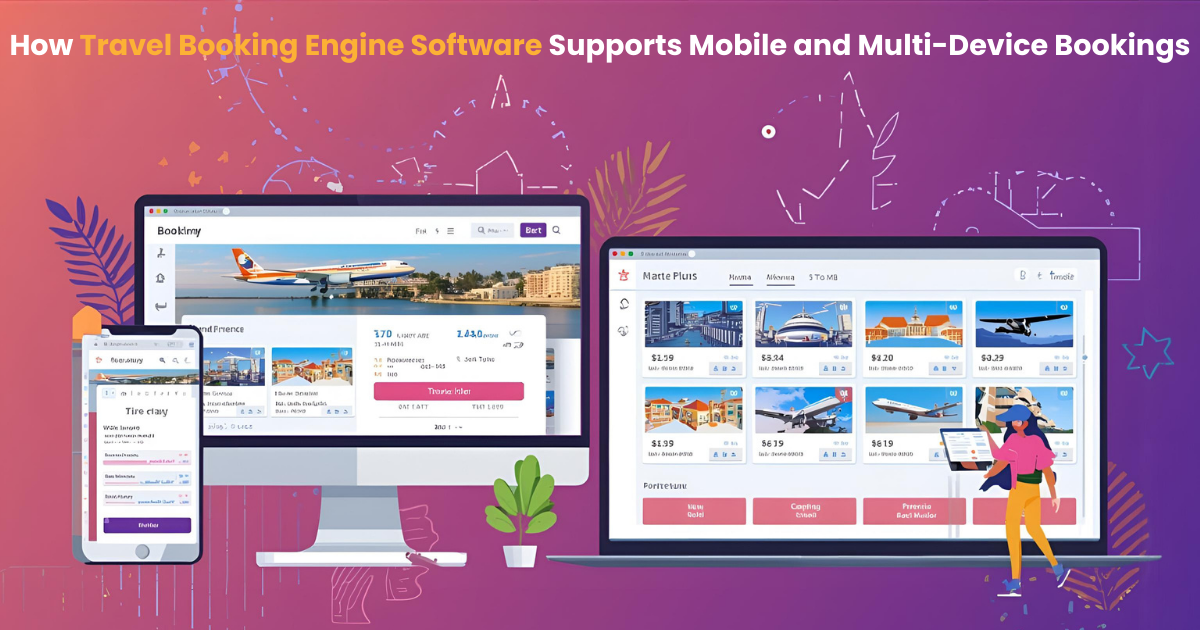Travelers today expect convenience at their fingertips. They want to book flights, hotels, car rentals, or vacation packages quickly and efficiently from any device—be it a smartphone, tablet, or desktop. A Travel Booking Engine Software acts as a centralized platform that allows travel agencies to provide consistent booking experiences across all devices. By integrating such software, businesses not only cater to evolving customer behaviors but also increase bookings and customer retention.
The Rise of Mobile Travel Bookings
Mobile devices have transformed how people plan and book travel. According to industry reports:
- Over 60% of travel bookings are made via smartphones and tablets.
- Mobile traffic to travel websites has surpassed desktop visits in many regions.
Consumer Behavior
Travelers now:
- Compare prices in real-time while on the go.
- Look for last-minute deals and immediate confirmations.
- Prefer apps or mobile websites for convenience and speed.
Impact on Travel Agencies
Without mobile-friendly solutions, travel agencies risk losing customers to competitors. A user-friendly mobile interface directly affects conversion rates, customer engagement, and long-term loyalty.
How Travel Booking Engine Software Adapts to Multiple Devices
Modern travel engines are designed with device adaptability in mind:
Responsive Design
- Automatically adjusts layout, fonts, images, and buttons according to screen size.
- Ensures readability and smooth navigation across smartphones, tablets, and desktops.
Device-Agnostic Booking
- Customers can start a booking on their mobile device and continue on a desktop or tablet without losing progress.
- Maintains session data and user preferences for seamless multi-device experiences.
Cloud Integration
- Updates inventory, pricing, and booking confirmations in real-time across all devices.
- Reduces double bookings and errors while enhancing operational efficiency.
This adaptability ensures that users enjoy a consistent and efficient booking process, regardless of the device used.
Key Features Supporting Mobile and Multi-Device Bookings
1. Mobile-Optimized Interfaces
- Simplified navigation with larger buttons, quick search options, and minimal scrolling.
- Faster loading times reduce bounce rates and enhance user satisfaction.
2. Single Sign-On (SSO)
- Users log in once and access their account seamlessly across devices.
- Reduces friction during login and encourages users to complete bookings.
3. Real-Time Synchronization
- Updates bookings, cancellations, and availability instantly across platforms.
- Ensures no discrepancies between devices, avoiding double bookings or errors.
4. Push Notifications
- Alerts customers about flight changes, promotions, or upcoming bookings.
- Engages users directly on mobile devices, increasing retention and repeat bookings.
5. Payment Flexibility
- Supports mobile wallets, UPI, credit/debit cards, and international payment gateways.
- Ensures secure and fast transactions, especially for last-minute bookings on mobile.
6. Offline Access
- Some travel booking engines allow users to view their itineraries and confirmations without internet connectivity.
- Useful for travelers in areas with limited network coverage or while commuting.
Benefits for Travel Agencies and Businesses
1. Enhanced Customer Experience
- Provides a smooth, intuitive interface across devices.
- Travelers enjoy uninterrupted booking journeys, increasing satisfaction.
2. Increased Bookings
- Mobile support captures last-minute bookings and spontaneous travel decisions.
- Multi-device capabilities ensure users can book anytime, anywhere.
3. Operational Efficiency
- Cloud-based synchronization reduces manual errors and administrative workload.
- Simplifies inventory management and pricing updates.
4. Brand Loyalty
- Consistent multi-device experiences encourage repeat usage.
- Push notifications and personalized recommendations enhance engagement.
5. Competitive Advantage
- Agencies offering robust mobile and multi-device support stand out in a crowded market.
- Attracts tech-savvy travelers seeking convenience and speed.
Challenges and Solutions
Challenge: Device Fragmentation
- Users access websites on different devices with varying screen sizes.
Solution: Use responsive and adaptive design frameworks to ensure a consistent interface.
Challenge: Mobile Payment Security
- Mobile transactions are vulnerable to fraud.
Solution: Integrate secure payment gateways, encryption, and tokenization for safe transactions.
Challenge: Real-Time Updates
- Maintaining accurate availability and pricing across multiple devices can be complex.
Solution: Leverage cloud-based infrastructure, APIs, and real-time synchronization to keep data accurate and consistent.
Future Trends in Multi-Device Travel Booking
AI-Powered Personalization
- Travel engines recommend destinations, deals, or packages based on past behavior and device usage.
Voice and Wearable Integration
- Users can book flights or hotels via smartwatches or voice assistants, enhancing convenience.
Progressive Web Apps (PWAs)
- Combines mobile app functionality with web accessibility, providing offline support and faster loading times.
Augmented Reality (AR)
- Travelers can visualize hotel rooms, tours, and attractions directly on mobile devices before booking.
Conclusion
Travel Booking Engine Software is no longer just a back-end solution—it’s a key driver for mobile and multi-device bookings. By offering responsive designs, cloud-based synchronization, secure payments, and personalized experiences, travel agencies can meet the expectations of modern travelers. Investing in robust booking engine software not only boosts revenue but also strengthens customer trust and loyalty in a competitive digital travel market.
FAQs
Q1: Can Travel Booking Engine Software work on both iOS and Android devices?
Yes, most modern travel engines are cross-platform compatible, supporting iOS, Android, and desktop browsers.
Q2: Do users need to install an app for mobile bookings?
Not always. Many engines offer mobile-optimized websites or Progressive Web Apps (PWAs) that function like apps.
Q3: How does multi-device booking improve customer experience?
It allows users to switch devices mid-booking without losing progress, providing seamless continuity.
Q4: Is real-time synchronization across devices secure?
Yes, encryption and secure cloud infrastructure ensure data integrity and privacy during real-time updates.
